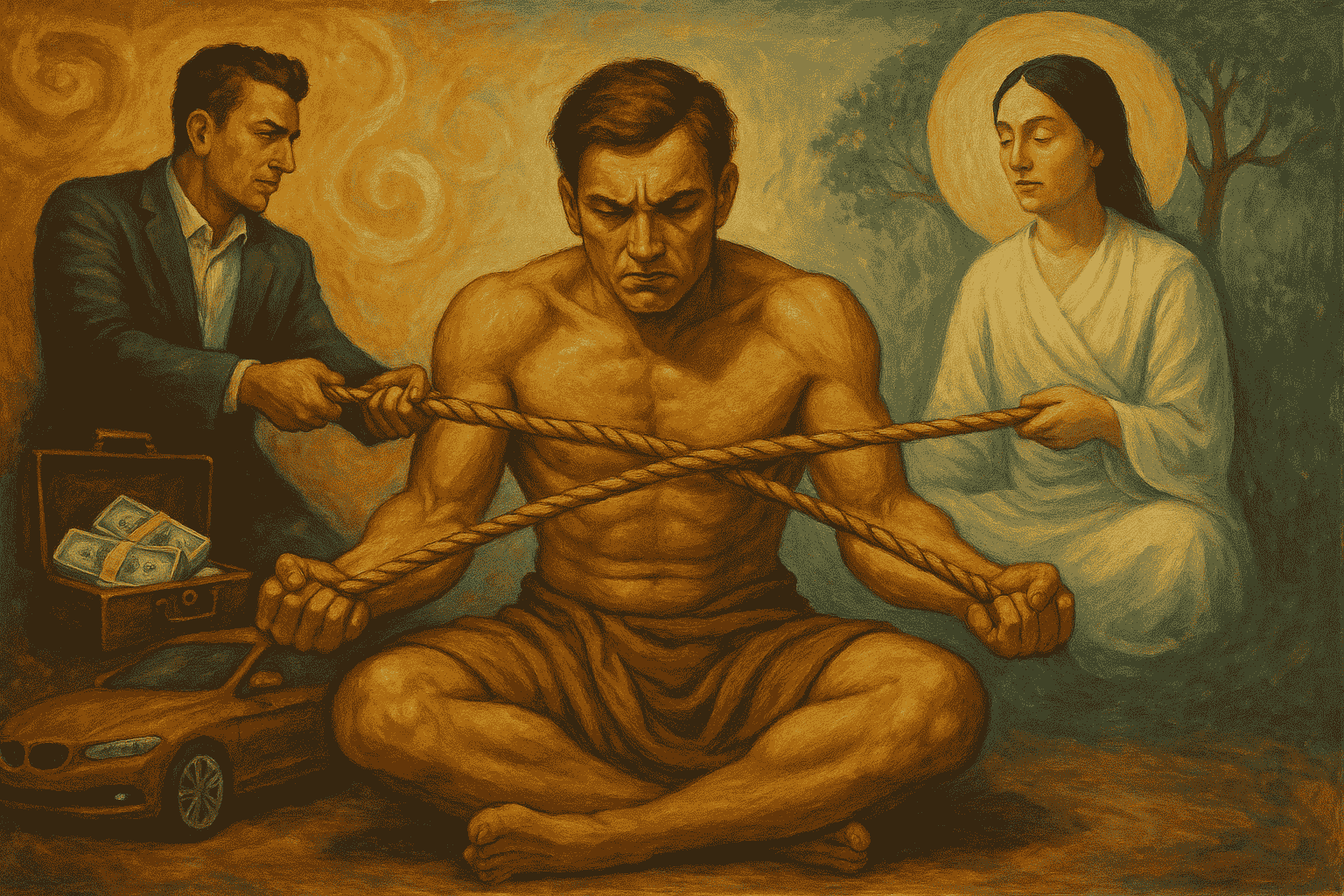You’ve worked hard. You’ve earned that promotion. Maybe you’ve bought your dream car, scrolled through congratulatory messages on social media, and gone to bed thinking this should feel amazing.
But deep inside, there’s a strange silence. A hollow space that all your achievements, luxuries, and recognition somehow can’t seem to fill.
That’s where the real conversation begins the ancient debate of Materialism vs Spiritualism.
In a world obsessed with speed, success, and possessions, we rarely stop to ask:
– Are we chasing happiness, or just collecting distractions?
– Do we own our wealth, or does our wealth own us?
For centuries, Indian philosophy has wrestled with this very paradox how to balance the physical and the spiritual, how to live fully in the world without becoming lost in it.
This blog explores the timeless conflict between Materialism vs Spiritualism, not as a moral argument, but as a journey one that each of us walks every single day, often without realizing it.
1. Understanding Materialism and Spiritualism
Before comparing materialism vs spiritualism, we need to understand what these two words truly mean.
Materialism: The Pursuit of the Tangible
Materialism isn’t just about greed or vanity it’s a mindset that measures success through visible, measurable things: money, possessions, power, and social standing. It’s the idea that happiness can be acquired.
In moderation, materialism can be healthy it gives us motivation to achieve, stability, and comfort. The problem begins when we start confusing possessions with purpose, and status with self-worth.
It’s when we begin saying, “Once I get this… then I’ll be happy.” But happiness, in the world of materialism, is always one step ahead forever out of reach.
Spiritualism: The Journey Within
Spiritualism, on the other hand, teaches that fulfillment comes not from what you have, but from what you are. It’s about awakening to the deeper truth of existence that we are not just the body or the mind, but consciousness itself.
In Indian philosophy, spiritualism isn’t about renouncing life it’s about realizing the eternal in the everyday. It’s the art of living with awareness, gratitude, and detachment, even while participating fully in the world.
2. Materialism vs Spiritualism: Two Paths, One Destination
At first glance, Materialism vs Spiritualism might look like opposites one chasing outer success, the other inner peace. But in truth, they are two sides of the same coin.
Materialism teaches us how to build; spiritualism teaches us why.
Materialism gives us comfort; spiritualism gives us meaning.
The conflict arises when we mistake one for the other.
When Materialism Becomes a Trap
Materialism promises satisfaction but rarely delivers it. The more we chase, the more restless we become. Why? Because possessions can please the senses but not the soul.
Every new purchase, every success, brings a temporary high followed by an inevitable low. This creates a loop a craving cycle where we keep searching for happiness outside, forgetting that real joy was never external.
The Bhagavad Gita describes this perfectly:
“Desire leads to attachment, attachment leads to anger, anger leads to delusion, and delusion leads to destruction of wisdom.”
When Spiritualism Is Misunderstood
True spiritualism is not about wearing saffron or escaping from society it’s about inner clarity. But often, people mistake spiritualism for escapism. They think it means rejecting ambition, relationships, or comfort.
However, the Gita again reminds us
“Perform your duty without attachment to results.”
That is active spiritualism: to live in the world, to work, to create but without losing yourself to the noise of it all.
3. The Modern Struggle: When Your Soul Feels Exhausted
If you’ve ever felt drained after endless scrolling, restless despite achievements, or lonely even when surrounded by people this section is for you.
Today’s world runs on the currency of comparison. Every click, every post, every reel subtly tells us that our life should look different, bigger, more glamorous.
This constant pressure fuels materialism, even when we don’t realize it. We begin living not for peace, but for perception.
Yet somewhere in between all the noise, our soul whispers:
“You are not here to chase you are here to experience.”
That whisper is the voice of spiritualism gentle, but persistent.
The truth is, we need both: material success to survive, and spiritual wisdom to live. The balance between Materialism vs Spiritualism is not found in extremes, but in harmony.
4. Signs You’re Leaning Too Much Toward Materialism
Recognizing imbalance is the first step toward awareness. Here are signs that your life may be leaning too far toward the material side:
1. Constant Comparison
You often measure your worth based on what others have jobs, homes, or lifestyles.
2. Emptiness After Achievements
You reach goals, but the happiness fades quickly. Each success feels like sand slipping through your hands.
3. Restless Mind
You can’t sit in silence. The idea of doing “nothing” feels uncomfortable, even frightening.
4. Neglect of Inner Needs
You rarely reflect, meditate, or connect inwardly because “there’s no time.”
5. Fear of Losing
You fear loss not of life, but of status, possessions, and image. That fear becomes a silent master.
If these resonate, it doesn’t mean you’re wrong or shallow it just means your energy is seeking balance.
5. How Spiritualism Brings You Back Home
If materialism is about external validation, spiritualism is about internal connection. It’s coming home to yourself to your peace, your stillness, your truth.
Here’s how spiritualism gently transforms your perspective:
1. Contentment Over Comparison
You stop running endless races. Instead of asking, “What’s next?”, you begin asking, “What matters?”
2. Purpose Over Possession
Spiritualism shifts your focus from owning more to being more. You start valuing experiences, relationships, and growth over things.
3. Awareness Over Anxiety
Through meditation and mindfulness, you reconnect with the present moment. Life slows down and suddenly, you start feeling again.
4. Gratitude Over Greed
You stop chasing happiness and start recognizing it in the simplest things: a sunrise, a cup of chai, a kind word.
5. Service Over Self
Spiritualism opens the heart. When you serve others, you experience the highest form of joy because giving is the soul’s natural language.
6. Indian Scriptures on Balancing Materialism vs Spiritualism
India’s ancient wisdom has never condemned wealth it only warned against attachment.
Bhagavad Gita
Lord Krishna never told Arjuna to renounce the world. He said, “Do your work with devotion, without attachment to outcomes.” That’s the essence of balancing Materialism vs Spiritualism living with purpose, not possession.
Upanishads
The Upanishads teach that the outer world is temporary, but the inner self is eternal. Chasing the material without touching the spiritual is like watering leaves while the roots stay dry.
Buddha’s Middle Path
Buddha rejected both extreme indulgence and extreme renunciation. His message: true freedom lies in the middle where you can enjoy the world without being enslaved by it.
Sri Ramakrishna’s Wisdom
He said: “Money is necessary, but keep it in your pocket not in your heart.”
That is spiritual mastery in one sentence.
7. Practical Ways to Balance Materialism and Spiritualism
Finding harmony between Materialism vs Spiritualism doesn’t mean abandoning one for the other it means creating conscious balance. Here’s how:
1. Start Your Day Without a Screen
Begin your morning with stillness, gratitude, or prayer before reaching for your phone. The first thing you feed your mind determines your vibration for the day.
2. Practice Detachment
Enjoy your possessions, but don’t depend on them. Remember they are for your use, not your identity.
3. Make Time for Reflection
Spend 10 minutes in silence every day. Ask yourself: Am I living, or just running?
4. Earn with Purpose
Money isn’t bad it’s a form of energy. But let it flow through acts of service and integrity. Use it to uplift yourself and others.
5. Connect, Don’t Compete
Instead of comparing lives, celebrate journeys. Every soul has its timing, its lessons, its rhythm.
6. Gratitude Ritual
Before sleeping, name three things you’re grateful for. Gratitude shifts your energy from lack to abundance.
7. Give Without Expecting
Donate, volunteer, or help someone in need without announcing it. Silent giving purifies the heart.
8. The Psychological Side of Materialism vs Spiritualism
Modern psychology echoes what spiritual masters taught centuries ago: happiness comes from within, not without.
Studies show that people focused primarily on material goals often experience more anxiety and dissatisfaction than those who nurture relationships, creativity, and mindfulness.
Dr. Martin Seligman, a pioneer in positive psychology, calls it “the hedonic treadmill” the tendency to keep chasing new pleasures that lose meaning over time.
Meanwhile, mindfulness, compassion, and gratitude pillars of spiritual living are scientifically proven to reduce stress, improve health, and increase joy.
So when we talk about Materialism vs Spiritualism, it’s not ancient superstition versus modern logic it’s heart meeting science.
9. The Real Secret: You Don’t Have to Choose
Here’s the truth most people miss: you don’t have to pick one side.
The goal is not to reject the material, but to awaken the spiritual within it.
Buy the car but don’t let it define you.
Enjoy the success but don’t lose your peace in protecting it.
Earn money but let generosity guide how you use it.
Materialism gives your body comfort. Spiritualism gives your soul freedom.
Both are essential like two wings of a bird.
But if one grows stronger than the other, you lose balance.
10. A Spiritual Perspective from Psychic Medium Daksh
As a psychic medium and spiritual teacher, I’ve met countless people who say, “I have everything, but I still feel something missing.”
What they’re describing isn’t depression it’s spiritual hunger.
It’s the soul whispering: “You’ve mastered the art of living, now master the art of being.”
Through mediumship and energy work, I’ve witnessed what happens when people reconnect with their higher selves they don’t abandon success, they simply stop being enslaved by it.
That’s the real power of spiritual awakening. It doesn’t make you less worldly—it makes you more whole.
Conclusion
The war between Materialism vs Spiritualism isn’t out there—it’s inside each of us. Every day, we stand at a crossroad: between craving and contentment, between ego and essence.
The truth is, you can live in a mansion and still be spiritual. You can meditate in silence and still appreciate luxury. What matters is attachment. When your happiness depends on things, you are bound. When it depends on your soul, you are free.
So maybe the answer isn’t choosing one over the other it’s blending both with awareness.
- Earn with integrity.
- Spend with gratitude.
- Live with purpose.
- Love without condition.
As Psychic Medium Daksh often reminds, life isn’t about what you collect, but what you connect with yourself, your spirit, and the divine energy that runs through all things.
That’s where materialism ends, and spiritualism begins.
And between them lies the most sacred truth balance.
Disclaimer: This blog includes information curated from multiple sources for reading purposes. This is not a medical advice and we do not take any responsibility for any actions you make take based on the uploaded information here.


